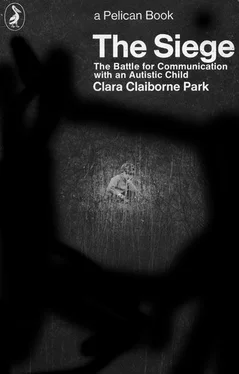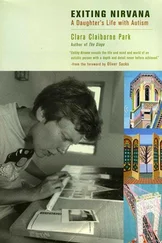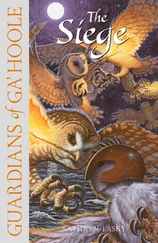And there were the things she did not repeat, but did once and once only. The day she came home from the hospital she saw a pair of scissors lying on the playroom floor, and suddenly, spontaneously, pronounced that difficult word with exemplary clarity. She repeated it, less clearly. She never said it again. One day she took the dustpan and brush and brushed the floor, just like any little girl who wants to be like her mother. One day she fed some cereal to a doll — once, and once only. Actions are past in a moment and time runs over them. One distrusts the senses, one distrusts memory. Had I seen these things? Had she done them at all?
How much did she take in of the world around her? Almost nothing, it appeared. Yet one day, several months before her third birthday, as we lay and scribbled, a pencil point broke. Elly got up in a businesslike manner, put the pencil into my hand, and propelled me towards the door. I hung back; I could not believe she knew where she was going. I wanted to test her. She pushed me through two rooms and into a third, straight to the pencil sharpener. I had not known she knew there was a pencil sharpener, let alone its location and its purpose. If she knew this, how much else did she know?
The doctor saw her again — the same intelligent G P who had delivered her, who had spotted her abnormality, who had supervised her first tests. Watching her precise and accurate lineup of the pegs in the holes of one of his office toys he could not, he said, think she was retarded. It could — he paused. It could be something else. If it were psychological — that he knew nothing about.
And neither did I.
I knew only that my fourth child was not like the others, who needed me and loved me, as I loved them. The fairies had stolen away the human baby and left one of their own. There she moved, every day, among us but not of us, acquiescent when we approached, untouched when we retreated, serene, detached, in perfect equilibrium. Existing among us, she had her being elsewhere. As long as no demands were made upon her, she was content. If smiles and laughter mean happiness, she was happy inside the invisible walls that surrounded her. She dwelt in a solitary citadel, compelling and self-made, complete and valid. Yet we could not leave her there. We must intrude, attack, invade, not because she was unhappy inside it, for she was not, but because the equilibrium she had found, perfect as it was, denied the possibility of growth. We had not demanded; now we must. We had accepted; now we must try to change. A terrible arrogance, for what had we to offer her? Which of us could call ourselves as content as Elly was? The world we would tempt her into was the world of risk, failure, and frustration, of unfulfilled desire, of pain as well as activity and love. There in Nirvana, why should she ever come out? Yet she was ours as well as her own, and we wanted her with us. If what we had to offer was not enough, we had nothing beside Confronted with a tiny child’s refusal of life, all existential hesitations evaporate. We had no choice. We would use every stratagem we could invent to assail her fortress, to beguile, entice, seduce her into the human condition.
Elly only seemed to live in isolation. In fact she lived with us. There were five other human beings in her house. We passed, we spoke, we touched, we provided. It is time to introduce ourselves, the family that should have made up Elly’s world.
Elly’s father is a professor. He learns, he teaches, he writes. His work is varied, demanding, and in the main satisfying. The college is small and very good. Professors there are teachers as well as scholars, and their students (note the personal pronoun) learn not merely by watching them operate at a distance but by working with them. It may be an exaggeration to say that these professors work here in this isolated valley instead of at one of the exciting intellectual factories for which their abilities qualify them, because they believe with Forster than ‘the personal is all that matters’. Yet most of the faculty is here by choice, and the choice has involved some such factor. My husband and I have spent almost all our lives in one school or another. Deep inside us, unspoken and unanalysed until Elly made us analyse it, is the conviction that all good learning is at last a matter of what is now called, with a show of scientific objectivity, ‘interpersonal relations’. We believed this, but we could not have guessed how deeply we were to test our belief.
We are a very academic family. My husband is a professor’s son; my mother was sent north to college from a small, provincial Southern town long ago at a time when to educate one’s girls at all was by no means the conventional thing to do. I, who tell this story, was when Elly was born a typical college-bred housewife, of the sort that forms the backbone of the League of Women Voters all over the country. I had had a fine education; I even had an M. A. , picked up at the same university where my husband did his graduate work, but I had gone no further. When David completed his Ph. D. we had been four years married, and although I enjoyed academic work and did it well I had no clear goals of the sort that would have been expected of me if I had been a man. As David entered on his professional life, it seemed reasonable for me to do what almost every other woman my age was doing — to start having babies. Before Elly came I had had three. Sara was seven when I learned Elly was on the way. Rebecca was six, Matthew three. It was a rounded, well-planned family, two girls and a boy.
There are thousands of families like us in this happy land. We live in a big house in a homogeneous community where neighbours are friends, wide lawns run into each other, and children find it safe to roam — a woman’s magazine daydream which happens to be true. Our town is an ideal place to rear children, if an ideal place is one which is free from insecurity and danger. Within two hundred yards of our house were fifteen or twenty children for Sara and Becky and Matt to know. A selection of these streamed steadily through our house, depositing balls, gum wrappers, and anonymous pieces of clothing; our children streamed correspondingly through the houses near by. These children were attractive and alert, brought up with care and considerable success by mothers like me, the mothers of the forties and fifties for whom Dr Spock had replaced the conventional wisdom. Of professional ability, most of us, we had made motherhood our profession. We read, we discussed our problems with each other. We were very knowledgeable. If I was unusual in anything, it was that I was less educated than most in the theoretical ins and outs of the infant psyche. Having studied no psychology in college, I eschewed the more recondite writings on the subject, lost patience with Gesell's heavy detail which never seemed to describe my own babies, and stuck to the common sense of Spock, freely corrected, as time went on, by my own. But I was like my friends m putting my full resources of intelligence and intuition into e task of bringing up my children. Every mother her own Piaget. I had observed, fascinated, their first approaches to language: how one small consciousness would begin with nouns, another with verbs — and speculated on what significance this might have as a key to their orientation to the world. I had watched their first slow movement from the domain of people and objects to the making of primitive abstractions. When Becky, at two, responded to her lot of low man on the neighbourhood totem-pole by remarking, ‘Sara bang me — Johnny bang me,’ and then, slowly and philosophically, ‘ Elly body bang me,’ I had sympathized, and laughed, and rejoiced at the spectacle of a mind unfolding. There had been so much to do. I had looked at books with them and later read them aloud. I had provided them with clay and batter and cleaned up the results. I had kept track of the innumerable but not interchangeable pieces of their educational toys. I had taught them letters and numbers and how to sound out words. I had seen to it that on their shelves were the children’s classics that would feed the imagination as well as inform the mind. I had punished and rewarded; I had tried to make them generous and self-con- trolled and unsuspicious and good. I had washed and cooked and coaxed and wrangled. I had used to exhaustion the full abilities of a grown-up woman in overseeing the first years of these small humans, and I was terribly proud of what I had done. Anyone would have said — many people did say — that I had three lovely children.
Читать дальше












